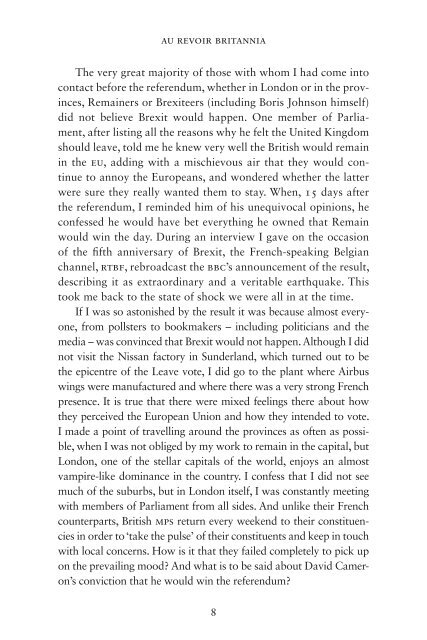Au Revoir Britannia by Sylvie Bermann sampler
From her unique perspective as former French ambassador to the UK, Sylvie Bermann examines the mistruths told by politicians surrounding the fateful 2016 Brexit referendum. Au Revoir Britannia asks the question ‘How did this happen?’ and exposes what she sees as the ‘unrepenting’ and ‘inveterate’ lies of the now pm, Boris Johnson. This first English edition includes a new preface exploring the future of post-Brexit Europe and Britain, and the uncertain implications of the Russian invasion of Ukraine.
From her unique perspective as former French ambassador to the UK, Sylvie Bermann examines the mistruths told by politicians surrounding the fateful 2016 Brexit referendum. Au Revoir Britannia asks the question ‘How did this happen?’ and exposes what she sees as the ‘unrepenting’ and ‘inveterate’ lies of the now pm, Boris Johnson. This first English edition includes a new preface exploring the future of post-Brexit Europe and Britain, and the uncertain implications of the Russian invasion of Ukraine.
You also want an ePaper? Increase the reach of your titles
YUMPU automatically turns print PDFs into web optimized ePapers that Google loves.
au revoir britannia<br />
The very great majority of those with whom I had come into<br />
contact before the referendum, whether in London or in the provinces,<br />
Remainers or Brexiteers (including Boris Johnson himself)<br />
did not believe Brexit would happen. One member of Parliament,<br />
after listing all the reasons why he felt the United Kingdom<br />
should leave, told me he knew very well the British would remain<br />
in the EU, adding with a mischievous air that they would continue<br />
to annoy the Europeans, and wondered whether the latter<br />
were sure they really wanted them to stay. When, 15 days after<br />
the referendum, I reminded him of his unequivocal opinions, he<br />
confessed he would have bet everything he owned that Remain<br />
would win the day. During an interview I gave on the occasion<br />
of the fifth anniversary of Brexit, the French-speaking Belgian<br />
channel, RTBF, rebroadcast the BBC’s announcement of the result,<br />
describing it as extraordinary and a veritable earthquake. This<br />
took me back to the state of shock we were all in at the time.<br />
If I was so astonished <strong>by</strong> the result it was because almost everyone,<br />
from pollsters to bookmakers – including politicians and the<br />
media – was convinced that Brexit would not happen. Although I did<br />
not visit the Nissan factory in Sunderland, which turned out to be<br />
the epicentre of the Leave vote, I did go to the plant where Airbus<br />
wings were manufactured and where there was a very strong French<br />
presence. It is true that there were mixed feelings there about how<br />
they perceived the European Union and how they intended to vote.<br />
I made a point of travelling around the provinces as often as possible,<br />
when I was not obliged <strong>by</strong> my work to remain in the capital, but<br />
London, one of the stellar capitals of the world, enjoys an almost<br />
vampire-like dominance in the country. I confess that I did not see<br />
much of the suburbs, but in London itself, I was constantly meeting<br />
with members of Parliament from all sides. And unlike their French<br />
counterparts, British MPs return every weekend to their constituencies<br />
in order to ‘take the pulse’ of their constituents and keep in touch<br />
with local concerns. How is it that they failed completely to pick up<br />
on the prevailing mood? And what is to be said about David Cameron’s<br />
conviction that he would win the referendum?<br />
8


















